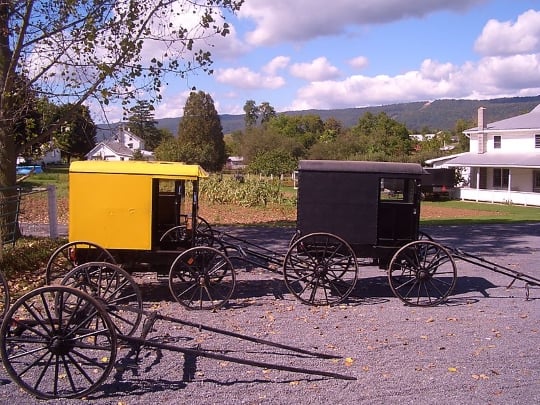Can Amish work in vineyards?
What are the boundaries of Amish work? Besides tech limitations, conscience corrals the jobs Amish will do. Morally-questionable businesses are out-of-bounds. For instance, you won’t find Amish working at reservation casinos in Wisconsin, or selling liquor in downtown Philadelphia.
But what about working in vineyards? Grape cultivation falls under agriculture, a comfortable occupational zone for Amish. Many Amish have their own home vines, using their fruits to craft juice and other treats. Beyond that, some Amish even make and consume their own homemade wines.
This past summer a vineyard owner hired a 4-man Amish crew to help manage his 9-acre vineyard in Chester County (bordering Lancaster County on the east). This article (no longer online) on a wine website describes the process of training and working with the men.
In places the author writes as if the Amish are from a foreign country or perhaps planet, which is sort of amusing when it’s not condescending. There are also a few interesting bits that may surprise you. For example:
The Amish do excellent work, but Dickerson concedes there are a couple of challenges. “They are much slower than many of the other crews out there,” he said.
Dickerson said he has certain benchmarks for how vines should be worked and how many rows he expects a worker to finish in a shift. The Amish, while they did an excellent job and did everything to Dickerson’s standards, just never met those benchmarks. And no matter how much more experience they gained, they just never managed to work quicker.
Eventually, Dickerson came to understand it was a cultural difference. “One will not outwork another,” he said. “They work only as fast as the slowest man.”
This made me raise an eyebrow. In fact I have seen more of the opposite with Amish competing to get jobs done the fastest. Perhaps this is a legend “cultivated” by the men to be able to work at a more enjoyable pace? 😉
Vines and Wines
Back to the original question: is working in a vineyard morally objectionable for Amish? Since some Amish consume alcohol (at the least, at Communion service), wine itself is not necessarily seen as an evil. A couple of years ago reader Vernon left this comment:
I work at as the Associate Winemaker at Fenn Valley Vineyards, in SW Michigan. The other Saturday a large bus load of Amish stopped at the winery and tasted and bought wine here. I doubt it’s for their chickens.
Furthermore, “vineyard” does not necessarily equal “winery”, as grapes can be used for different purposes.
Amish will probably be of different minds on this. New Order Amish have a strong stance against alcohol, and I’d think would be less likely to take up any work that could be associated with intoxicating drink. Reader Valerie recently commented on an Amish response to wine businesses in Ohio:
In Holmes County OH there are some wineries. And one of them was approached by an Amish Bishop, from what I heard, to change their sign on the road as it gave the impression that this was an Amish winery. So now the sign reads “Amish Country Wines”. But they do like to put horse & buggy on some of their labels-(admittedly, I bought some!) The Amish do make their own wine for communion and possibly do not abstain in addition to communion, I can’t say for sure what their ordinance is on the matter-but one thing-they did not want the public believing this winery was Amish!
Will Amish ever run their own commercial vineyards? I haven’t heard of any, though perhaps someone out there is doing this. Again, grapes can be used for wine and grapes can be used for other purposes. Perhaps vineyards are too-closely associated with alcohol production to ever be a widely-acceptable business for the Amish. For some, however, it seems to be okay to work in them.




I wonder if the Amish that keep their own wine and use it for medicinal purposes. There are medical reports out that certain wine can ease heart diease and what all. My Mom was not Amish, but came from the hills of Kentucky. She believed that certain problems could be eased with a shot of wine-but he had to be certain wine.
Marilyn
When its a sin
The fact is this: They must see the “Act of drinking” as acceptable while the “State of drunkenness” is not acceptable. Certainly different communes may regulate this issue differently but various beliefs on “Christian Liberty” may be present.
I personally am a “Tee Totaller”. Why? Because as harmless as a single drink is, I can never stop at just one. So I stopped all together so as to be sober in the event of Christ’s return to collect my soul. The Bible does make mention of certain individuals acceptance of alcohol being okay. I don’t know the book or chapter but I know it is there.
Vineyards
Old Order people used to be heavily involved in growing tobacco but as tobacco use became less acceptable, many quit growing. Grapes are different in that they have purposes other than just wine making. Some Old Order people have had vinyards in the Finger Lakes region in New York. We grow our own grapes and enjoy our own grape juice most mornings. It would probably beup to individual communities and even individuals how strongly they felt about being involved in producing alcoholic beverages. For some, the fact that Jesus used parables about working in a vinyard would make the practice more acceptable.
That is an excellent point. I haven’t found anything in the Bible that specifically bans drinking but being drunk is forbidden.
Tobacco and Smoking
I’ve read stories of Amish tobacco farms in southern Maryland (don’t know if they’re still in business) and seen young Amish men smoking in Danville, OH (Knox County, adjacent to Holmes and Wayne.) Our Knox County cabin was Amish-built. We often found empty beer cans at the building site. The Amish are surrounded by English who drink, smoke and chew constantly.
Amish tobacco use and cultivation
Forsythia, interesting, and as far as I know you are right they do still grow tobacco in southern Maryland. Those are Lancaster-origin Amish, and of course many grow tobacco in Lancaster County as well. One of the places I stay when I visit Lancaster is at a traditional tobacco/dairy farm. They raise the crop but no one in the family actually uses it.
There is also Cecil County in Maryland. This article from 2004 discusses how the Amish there are also growing tobacco. I’m not sure of the current state of things with this settlement; when I visited this community a couple of years ago I couldn’t find many Amish there, just a few homes, though my radar may have missed them 🙂
http://articles.baltimoresun.com/2004-03-28/news/0403280273_1_tobacco-cecil-county-amish
The issue is controversial among Amish; most do not grow the crop, but there is a strong tradition among Lancaster County people. My home state, North Carolina, is a tobacco leader, but the only Amish community in NC I’m sure would not participate in the industry, being a New Order community. The same goes for the 3rd Maryland Amish community at Oakland, also New Order. If you’re interested Brad Igou at Amish Country News has a good piece which touches on Amish thought on the tobacco topic.
http://www.amishnews.com/amisharticles/amishtobacco.htm
OK in my opinion
With many Amish now working away from the home and the cost of land in Pa. being so high I feel this is an acceptable job for them in my opinion. As stated before the grapes could be used for other purposes in this case we know they are not. I do not agree with the winery in Oh. using the Amish as a selling point and I’m glad they did change the sign. The Amish are working Gods land they are not promoiting drinking or getting drunk in any form. I do feel bad thaough how so many people take advanytage of the Amish that are not associated with the Amish to sell their products and make money. But as I have read many times if it says Amish made most likely it is not made by the Amish.
I was also surprised that the Amish men were not speedy enough for the vineyard owner. But when I read the article and saw they only got paid $10 an hour it made sense. That may seem like good wages to migrants but Amish men supporting a family won’t get far in Lancaster county with a paycheck like that. My guess is the Amish men aren’t fool enough to work crazy fast for a puny paycheck. It is temporary work with little room for improvement in wages.
Amish wine
I asked Mark about this. He said that he knows that most Amish families have their own grape arbors. They use the grapes to make grape juice which is canned. Also to make grape jam, jellies, etc. Homemade wine is made in Mark’s district by the deacon’s wife to be used at the twice yearly communion. The Amish do use wine and not grape juice for communion. As to working in a vineyard Mark said that he doesn’t know of any Amish that do. But where we live in Ohio is not a grape growing area. Grapes are a crop. Not much difference picking grapes as there is to picking apples which might then be turned into hard cider. Not to mention growing various grains which can then be used to make beer and whiskey.
This is interesting Don. I know Mark’s church is New Order, I had understood that some New Order churches actually do use grape juice instead of wine.
Windgate Winery Smicksburg PA
The Windgate Winery near Smicksburg PA once used Amish workers – not sure if they still do or not. One of their wines was called Amish Blush.
Interesting, Ed, thanks for sharing. By the way some Amish may blush at the thought of working at a winery. Ha-ha.
Amish Blush Wine
Below is a description of the Amish Blush Wine sold in Smicksburg, PA. The label for the Amish Blush wine has a farm scene with an Amish buggy in the background. Eye of the Shadow Wine pays homage to Punxsy Phil, groundhog celebrity.
Rose Wines
Windgate offers two rose wines, each uniquely different.
EYE OF THE SHADOW: A sprightly, fruity, semi-sweet rose. It’s name and label pay homage to Punxsutawney Phil, our local celebrity groundhog.
AMISH BLUSH: A palatable blend of French hybrids in the versatile blush finish results in a light-bodied, clean and aromatic sweet wine to accompany any meal.
I wonder what the general Smicksburg Amish alcohol practice is. Some communities are more open towards alcohol consumption (sometimes even the hard stuff).
Just FYI, I spoke with one of our (Conservative Mennonite)Bishops yesterday and posed the question to him. He opined that even though it had not come up as a question in our conference, that it would probably be frowned upon due to most of the product being used to make wine. Some families do grow grapes for fresh eating, jelly, or grape juice, and have done so for years.
I think that quality wine, made with care – from vine to glass – can be said to give praise to God and creation. Moderate appreciation of an agricultural (and cultural) product that is very much part of the Biblical narrative, seems entirely reasonable. I think that Prohibition really skewed the narrative in our culture. There are entirely understandable reasons for approaching alcohol with care and responsibility…but it needn’t be a black-and-white issue. Personally, I would happily patronize an Amish brewery or winery if such existed in my area.